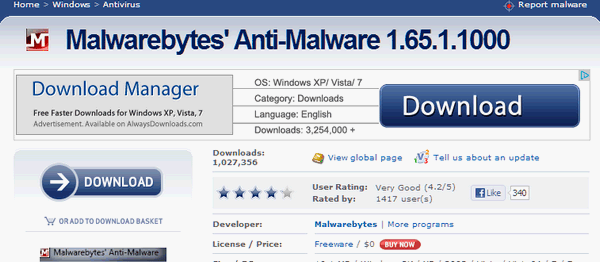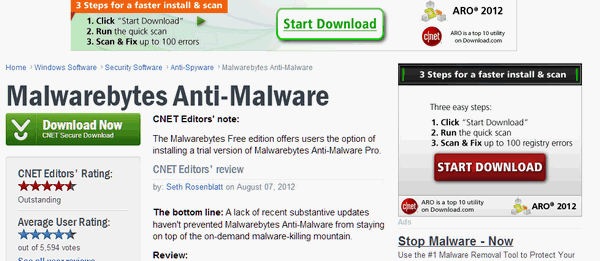Back in the day, Web sites got paid for advertising on based on the number of page views the site received. This was good for Web site owners and for site visitors. No one had to click anything for the Web site owner to make some dollars on advertising. It was kind of like TV advertising where cost per advertisement is based on the number of viewers — the more viewers the more the TV channel can charge for the ad.
But the Web was new and no one was sure what kind of advertising would work best. Web sites were happy, visitors were happy, but advertisers were not happy. They didn’t feel they were getting their money’s worth — and it’s really all about the money after all.
So everything changed. And now most Web sites that feature advertisements, only get paid if someone clicks on an advertisement. There’s nothing intrinsically wrong with that — however it leads to some shenanigans by Web site owners in order to induce visitors to click on something they would not normally click on.
Which leads us to the Download Button Conspiracy. It seems many sites have lowered themselves to blatant trickery in order to induce the visitor to click something. It’s cheating, of course. It’s cheating the site visitor and it’s cheating the advertiser — unless the advertiser is in cahoots with this type of click scheme. And unfortunately, many are.
And of the many that are, most are companies like Ask.com, Babylon, and other “toolbar” specialists who just want to get their cruddy software on your computer so they can use your browser and your computer and your searches to make money. Who, in their right mind, would download Ask Toolbar or Babylon Toolbar and intentionally hijack their own browser? And there are many more besides Babylon and Ask. Now there seems to be a wave of new “download managers” promising faster and better downloads – and delivering nothing but more search and browser hijackers.
Is there no end to the deceit and trickery? Apparently not if there is money to be made.
We have had subscribers write to us and complain about freeware we have recommended, insisting the link was not for the program they thought, and oftentimes scolding us because our link “downloaded a trial of some other program”!
WE CAUTION YOU AGAIN! When you are downloading files from free sites, many have made it more and more difficult, almost to the point of confusion and deceit, to know which DOWNLOAD button you are actually supposed to click to download the file you actually want to download.
Why? Because every click equals money. The only click that doesn’t equal money is the click you make to download the file or program you want. So there is all kind of incentive for sites to mislead you and trick you into clicking something other than the actual download link to the program or file you want.
There aren’t any programs you can install to help you choose the right download button. You have to use the only thing we have – we have to use our brains.
Site’s like Download.com and SoftPedia earn lots of money by sticking download buttons all over their download pages hoping you’ll click the wrong one.
There are some download sites who don’t do this — one we’ve found is FileHippo. FileHippo’s correct download links are always easy to find — they are always in the top right side of the page.
Here’s an example of a FileHippo download page:

Notice how easy it is to find the download link?
Now compare that do a SoftPedia download page.

Or a CNet download page.

When we recommend a freeware program, we take care to download the correct file and test it well. And if the program contains bundled software (sometimes it’s almost impossible anymore to find great programs that don’t try to bundle something) we’ll warn you to use care during installation and uncheck the boxes that urge you to install something else besides the program you want.You should always use care, especially in these times where so many freeware programs bundle other software, whenever you install anything. Even paid software is starting to bundle other software with it. It isn’t right, but it is what it is.
Unless FileHippo starts getting crazy and sticking download buttons all over their download pages, we will continue to recommend them as our first choice for downloading software. You can see for yourself at http://www.filehippo.com/ .
Don’t let anyone trick your click.


Great article! Thanks for posting this!
This has happened to me in the past, I learned to really
read and find the right button, the hard way!
Great article. Good advise as I have fallen into the same trap more than once. I am really careful and read all the page sometimes more than once.
Anyone who hasn’t had this happen to them at some time or another must be a shear genius!
You can look and can puzzle about which one to use being very careful and still end up using the wrong download button – especially if you’re in a hurry.
With age, I’m learning to be a little more patient and go a little slower. Saves time in the long run!!
Thanks for the reminder to look carefuly.
I thought about downloading the Windows Cleanup thing but when I saw this site with a choice of download buttons, I became suspicious and changed my mind. I’m too good at getting it wrong to risk it. Now, thanks to your timely email, I can download it confidently.
Thank you,
Barb.
One of my big gripes too! Thanx for posting.
I had to learn the hard way, right on this site!
Thank heaven for these posts. I just thought I was thick!!!
Timely advice. I have no respect for any company that tries to fool their potential customers. Thanks for the warning.
So true. Sometimes I haven’t found the correct download button. Beware of a little check box at the side of the download button too, to avoid installing other things, like toolbar or trial. It can easily be missed, and is usually already checked, which means you must uncheck it first.
I have gotten by this at times by typing the name of the program in google search and going right to the programs page.